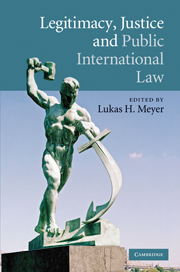Book contents
- Frontmatter
- Contents
- List of contributors
- Acknowledgements
- Introduction: Legitimacy, justice and public international law. Three perspectives on the debate
- 1 The legitimacy of global governance institutions
- 2 Institutionalising global demoi-cracy
- 3 The responsibilities and legitimacy of economic international institutions
- 4 Do international organisations play favourites? An impartialist account
- 5 ‘Victors’ justice'? Historic injustice and the legitimacy of international law
- 6 International law and global justice
- 7 Global justice: Problems of a cosmopolitan account
- 8 The responsibility to protect human rights
- 9 The threat of violence and of new military force as a challenge to international public law
- 10 Forcing a people to be free
- Index
- References
8 - The responsibility to protect human rights
Published online by Cambridge University Press: 03 May 2010
- Frontmatter
- Contents
- List of contributors
- Acknowledgements
- Introduction: Legitimacy, justice and public international law. Three perspectives on the debate
- 1 The legitimacy of global governance institutions
- 2 Institutionalising global demoi-cracy
- 3 The responsibilities and legitimacy of economic international institutions
- 4 Do international organisations play favourites? An impartialist account
- 5 ‘Victors’ justice'? Historic injustice and the legitimacy of international law
- 6 International law and global justice
- 7 Global justice: Problems of a cosmopolitan account
- 8 The responsibility to protect human rights
- 9 The threat of violence and of new military force as a challenge to international public law
- 10 Forcing a people to be free
- Index
- References
Summary
I start from the assumption that the responsibility to protect human rights is an international responsibility. Protecting human rights is not just a matter of each state protecting the rights of its own citizens, even though this is one of its primary functions and (arguably) a condition of its legitimacy. For various reasons that I will come to shortly, making human rights protection purely an internal responsibility of states is not going to be effective in many cases. So the wider responsibility falls on that rather elusive entity ‘the world community’. Now let me immediately specify, for purposes of the present discussion, the scope of the responsibility to protect. First, the human rights at stake are to be understood in a fairly narrow sense, as basic rights – rights to life, bodily integrity, basic nutrition and health, and so forth. When we invoke the international responsibility to protect, we are thinking about those all-too-familiar instances in which human beings are being placed in life-threatening situations, in which they are being starved, or terrorised, or evicted from their homes, or are dying from disease – in other words are caught up in what we have learnt to call humanitarian disasters. We are not primarily thinking in this context about rights that fall outside this core, such as rights to free speech or political participation, important though these may be in other respects.
- Type
- Chapter
- Information
- Legitimacy, Justice and Public International Law , pp. 232 - 251Publisher: Cambridge University PressPrint publication year: 2009
References
- 7
- Cited by

